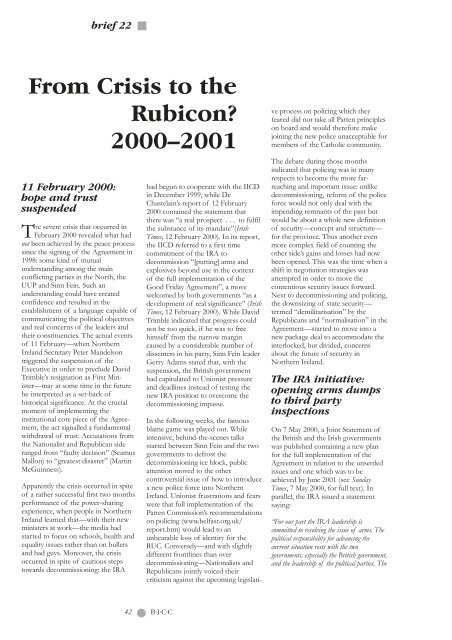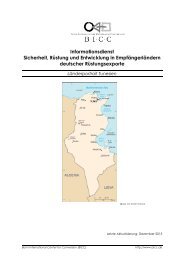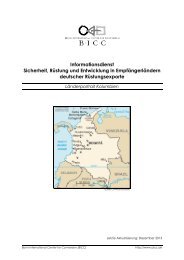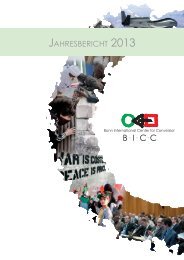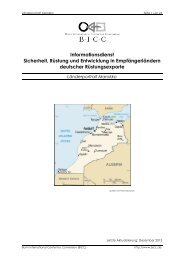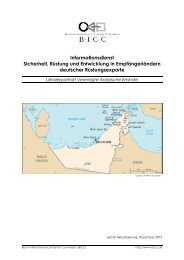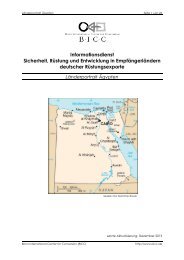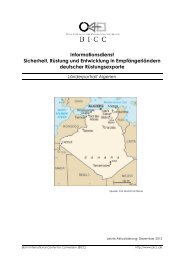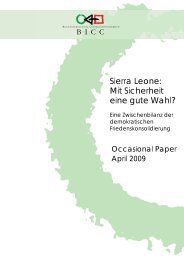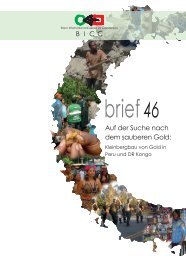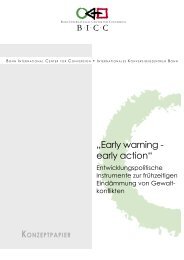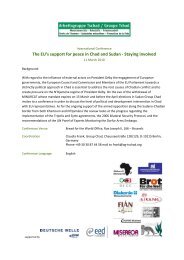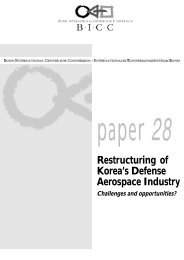English - BICC
English - BICC
English - BICC
Create successful ePaper yourself
Turn your PDF publications into a flip-book with our unique Google optimized e-Paper software.
ief 22<br />
From Crisis to the<br />
Rubicon?<br />
2000–2001<br />
11 February 2000:<br />
hope and trust<br />
suspended<br />
The severe crisis that occurred in<br />
February 2000 revealed what had<br />
not been achieved by the peace process<br />
since the signing of the Agreement in<br />
1998: some kind of mutual<br />
understanding among the main<br />
conflicting parties in the North, the<br />
UUP and Sinn Fein. Such an<br />
understanding could have created<br />
confidence and resulted in the<br />
establishment of a language capable of<br />
communicating the political objectives<br />
and real concerns of the leaders and<br />
their constituencies. The actual events<br />
of 11 February—when Northern<br />
Ireland Secretary Peter Mandelson<br />
triggered the suspension of the<br />
Executive in order to preclude David<br />
Trimble’s resignation as First Minister—may<br />
at some time in the future<br />
be interpreted as a set-back of<br />
historical significance. At the crucial<br />
moment of implementing the<br />
institutional core piece of the Agreement,<br />
the act signalled a fundamental<br />
withdrawal of trust. Accusations from<br />
the Nationalist and Republican side<br />
ranged from “faulty decision” (Seamus<br />
Mallon) to “greatest disaster” (Martin<br />
McGuinness).<br />
Apparently the crisis occurred in spite<br />
of a rather successful first two months<br />
performance of the power-sharing<br />
experience, when people in Northern<br />
Ireland learned that—with their new<br />
ministers at work—the media had<br />
started to focus on schools, health and<br />
equality issues rather than on bullets<br />
and bad guys. Moreover, the crisis<br />
occurred in spite of cautious steps<br />
towards decommissioning: the IRA<br />
had begun to cooperate with the IICD<br />
in December 1999, while De<br />
Chastelain’s report of 12 February<br />
2000 contained the statement that<br />
there was “a real prospect . . . to fulfil<br />
the substance of its mandate”(Irish<br />
Times, 12 February 2000). In its report,<br />
the IICD referred to a first time<br />
commitment of the IRA to<br />
decommission “[putting] arms and<br />
explosives beyond use in the context<br />
of the full implementation of the<br />
Good Friday Agreement”, a move<br />
welcomed by both governments “as a<br />
development of real significance” (Irish<br />
Times, 12 February 2000). While David<br />
Trimble indicated that progress could<br />
not be too quick, if he was to free<br />
himself from the narrow margin<br />
caused by a considerable number of<br />
dissenters in his party, Sinn Fein leader<br />
Gerry Adams stated that, with the<br />
suspension, the British government<br />
had capitulated to Unionist pressure<br />
and deadlines instead of testing the<br />
new IRA position to overcome the<br />
decommissioning impasse.<br />
In the following weeks, the famous<br />
blame game was played out. While<br />
intensive, behind-the-scenes talks<br />
started between Sinn Fein and the two<br />
governments to defrost the<br />
decommissioning ice block, public<br />
attention moved to the other<br />
controversial issue of how to introduce<br />
a new police force into Northern<br />
Ireland. Unionist frustrations and fears<br />
were that full implementation of the<br />
Patten Commission’s recommendations<br />
on policing (www.belfast.org.uk/<br />
report.htm) would lead to an<br />
unbearable loss of identity for the<br />
RUC. Conversely—and with slightly<br />
different frontlines than over<br />
decommissioning—Nationalists and<br />
Republicans jointly voiced their<br />
criticism against the upcoming legislati-<br />
42 B·I·C·C<br />
ve process on policing which they<br />
feared did not take all Patten principles<br />
on board and would therefore make<br />
joining the new police unacceptable for<br />
members of the Catholic community.<br />
The debate during those months<br />
indicated that policing was in many<br />
respects to become the more farreaching<br />
and important issue: unlike<br />
decommissioning, reform of the police<br />
force would not only deal with the<br />
impending remnants of the past but<br />
would be about a whole new definition<br />
of security—concept and structure—<br />
for the province. Thus another even<br />
more complex field of counting the<br />
other side’s gains and losses had now<br />
been opened. This was the time when a<br />
shift in negotiation strategies was<br />
attempted in order to move the<br />
contentious security issues forward.<br />
Next to decommissioning and policing,<br />
the downsizing of state security—<br />
termed “demilitarisation” by the<br />
Republicans and “normalisation” in the<br />
Agreement—started to move into a<br />
new package deal to accommodate the<br />
interlocked, but divided, concerns<br />
about the future of security in<br />
Northern Ireland.<br />
The IRA initiative:<br />
opening arms dumps<br />
to third party<br />
inspections<br />
On 7 May 2000, a Joint Statement of<br />
the British and the Irish governments<br />
was published containing a new plan<br />
for the full implementation of the<br />
Agreement in relation to the unsettled<br />
issues and one which was to be<br />
achieved by June 2001 (see Sunday<br />
Times, 7 May 2000, for full text). In<br />
parallel, the IRA issued a statement<br />
saying:<br />
“For our part the IRA leadership is<br />
committed to resolving the issue of arms. The<br />
political responsibility for advancing the<br />
current situation rests with the two<br />
governments, especially the British government,<br />
and the leadership of the political parties. The


